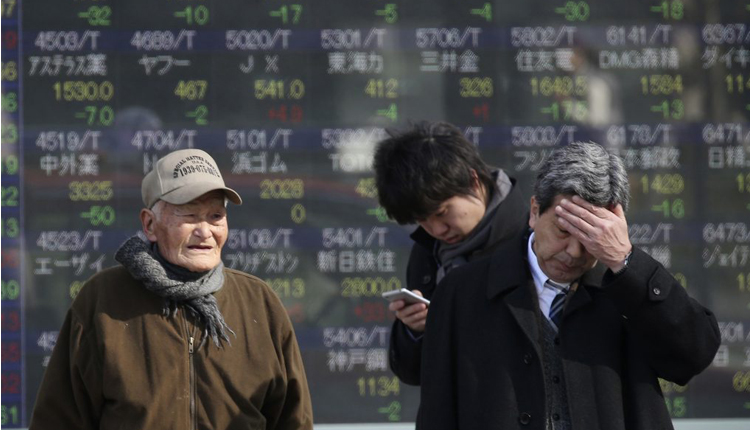Asian markets traded mixed on Tuesday afternoon on the back of a volatile session on Wall Street which saw the Dow recover from a 507-point drop.
The mainland Chinese stocks saw gains by the end of the morning session. The Shanghai composite rose 0.28 percent while the Shenzhen composite advanced 0.597 percent.
Hong Kong’s Hang Seng index, on the other hand, slipped 0.11 percent.
In Japan, the Nikkei 225 fell 0.32 percent while the Topix index declined by 0.84 percent to trade at lows below 1,581.56 not seen since Sept. 2017, according to Reuters.
Shares of Japanese conglomerate Softbank gained around 2.4 percent after the company announced on Monday that shares of its mobile unit IPO would be priced at 1,500 yen apiece (approx. $13.25). Softbank is expected to raise 2.65 trillion yen from the listing (approx. $23.4 billion).
Meanwhile, South Korea’s Kospi rose fractionally with shares of LG Electronics higher by nearly 2 percent.
Australia’s ASX 200 shed most of its earlier gains to trade largely flat in the afternoon, despite most sectors seeing gains.
Shares of Australia’s so-called Big Four banks traded mixed in the afternoon. Australia and New Zealand Banking Group slipped 0.20 percent and Commonwealth Bank of Australia was largely flat. Westpac, on the other hand, rose 0.40 percent and National Australia Bank climbed up by 0.11 percent.
UK government delays Brexit vote
Prime Minister Theresa May delayed a Brexit vote that was set to take place on Tuesday in the U.K. parliament.
The move was confirmed in a statement by May to lawmakers in the House of Commons on Monday afternoon.
The now-delayed vote in the House of Commons, termed the “meaningful vote,” was to allow lawmakers to accept or reject the terms of Brexit that the EU and British government had previously agreed.
May claimed that while there was broad support for her deal, the issue of the Northern Irish backstop remained a concern and she would return to European counterparts to renegotiate the deal.
“I will hold emergency talks with EU leaders to discuss possible changes to backstop,” May said.
The British pound fell to a 21-month low following the announcement. It last traded at $1.2577.
One analyst, however, told CNBC’s “Squawk Box” on Tuesday that the uncertainty surrounding Brexit could actually present buying opportunities for Asian companies.
“I think increasingly, looking at the U.K., not only is the stock market weak, but the currency is weak as well,” said Jim McCafferty, head of Asia (ex-Japan) research at Nomura Securities.
“From an outside investor’s point of view, the assets are getting cheaper in local currency terms and assets are getting cheaper in stock market terms,” McCafferty added. “So that might be an opportunity for acquisitive Asian companies to buy strategic assets in the U.K.”
Wall Street bounces from declines
In overnight market action stateside, the Dow Jones Industrial Average erased an intraday 507-point drop to close 34.31 points higher at 24,423.26 while the S&P 500 advanced 0.2 percent to finish the trading day at 2,637.72. The Nasdaq Composite rose 0.7 percent to close at 7,020.52.
At its lows of the day, the S&P 500 dipped below its low reached in October during the previous major market sell-off. These technical breakdowns typically lead to more selling as some computer programs are set to dump stocks on those levels.
RBI chief departs abruptly
The Reserve Bank of India’s governor, Urjit Patel, resigned with immediate effect on Monday, raising concerns over the independence of the central bank.
The primary focus for investors is whether Patel resigned due to growing pressure from India’s government to lower rates and conduct looser monetary policy as the countdown to next year’s general election kicks off. Patel was reportedly criticized by the government for the central bank’s relentless push to clean up India’s banking sector.
Patel’s resignation comes less than three years after his predecessor Raghuram Rajan was not confirmed for a second term as central bank governor in 2016, possibly due to growing tensions between him and India’s government.
Following the announcement, the rupee fell sharply against the dollar. The Indian currency was last at 72.261 against the greenback, after trading above 71.2 in the previous session.
“Urjit Patel’s resignation for ‘personal reasons’, well before the expiry of his term in September 2019, in fact, goes to reinforce the widened rift between the central bank and the government,” Prakash Sakpal, an economist at ING, said in an article published on Monday.
“Clearly, central bank independence is compromised, and the government indeed now has greater control of the central bank and its reserves, which are required to plug the widening fiscal deficit in the election year,” Sakpal said.
Currencies
The U.S. dollar index, which tracks the greenback against a basket of its peers, was at 97.108 after rising from levels around 96.4 yesterday.
The Japanese yen traded at 113.06 against the dollar after seeing highs around above 112.2 yesterday. The Australian dollar was at $0.7203 after seeing an earlier low of $0.7182.
Source: CNBC
